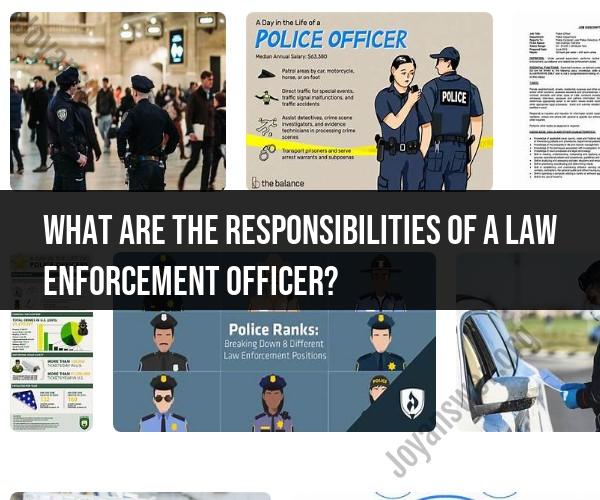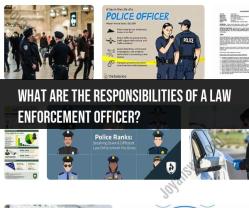What are the responsibilities of a law enforcement officer?
The responsibilities of a law enforcement officer can vary depending on the specific agency, jurisdiction, and role within the department. However, there are several core duties and roles that are typically associated with law enforcement officers. These responsibilities are essential for maintaining public safety, upholding the law, and protecting the community. Here are the primary responsibilities of a law enforcement officer:
Upholding the Law: Law enforcement officers are responsible for enforcing federal, state, and local laws. They must ensure that individuals and organizations comply with legal regulations and take appropriate action when laws are violated.
Patrolling and Surveillance: Officers regularly patrol assigned areas, respond to emergency calls, and conduct surveillance to prevent and detect criminal activity. Patrolling neighborhoods, highways, and public spaces is a key part of their role.
Crime Prevention: Officers work to prevent crime by actively engaging with the community, providing education and outreach, and identifying potential risks or threats. They may also collaborate with community organizations to address the root causes of criminal behavior.
Investigation: When a crime occurs, law enforcement officers investigate the incident. This involves gathering evidence, interviewing witnesses and suspects, and building a case for prosecution. Detectives often specialize in more complex investigations.
Arrest and Detention: Officers have the authority to arrest individuals who have committed crimes or have active warrants for their arrest. They must follow proper procedures and ensure the rights of suspects are upheld. After an arrest, they may be responsible for transporting and booking the individual into custody.
Traffic Control and Enforcement: Many officers are responsible for enforcing traffic laws, directing traffic, and investigating accidents. They issue citations for traffic violations and may conduct DUI checkpoints to deter impaired driving.
Emergency Response: Law enforcement officers are often among the first to respond to emergencies, including accidents, natural disasters, and incidents involving violence. They provide assistance, secure the scene, and coordinate with other emergency services.
Community Policing: Officers engage with the community to build trust, address concerns, and foster positive relationships. They attend community meetings, participate in outreach programs, and work to bridge gaps between law enforcement and the public.
Use of Force: Officers are trained to use force only when necessary and within the bounds of their department's policies and the law. They must make split-second decisions regarding the use of force to protect themselves and others.
Testifying in Court: Officers often testify in court as witnesses, presenting evidence and providing testimony related to their investigations. Their testimony can be crucial in the legal process.
Conflict Resolution: Officers frequently mediate disputes and diffuse tense situations to prevent violence or escalation. They may also provide counseling or referrals for individuals in crisis.
Paperwork and Reporting: Officers must complete reports and documentation related to incidents, arrests, investigations, and other activities. Accurate record-keeping is essential for legal and administrative purposes.
Continuing Training: Law enforcement officers undergo ongoing training to stay updated on laws, tactics, and best practices. This includes firearms training, legal updates, and cultural sensitivity training.
Ethical Conduct: Officers are expected to uphold high ethical standards and adhere to a code of conduct that includes integrity, honesty, and respect for individual rights.
It's important to note that law enforcement officers serve a diverse range of roles within their departments, including specialized units such as SWAT teams, K-9 units, narcotics divisions, and cybercrime units. Their responsibilities can also vary depending on the size and location of the law enforcement agency. Overall, the primary goal of law enforcement officers is to protect and serve their communities while upholding the law and ensuring the safety of all individuals.
Exploring the Duties and Responsibilities of Law Enforcement Officers
Law enforcement officers, also known as police officers, are responsible for maintaining public safety and enforcing the law. Their duties and responsibilities vary depending on their jurisdiction and the type of law enforcement agency they work for, but some common tasks include:
- Responding to calls for service, such as accidents, crimes, and emergencies
- Patrolling their assigned area to deter crime and identify potential threats
- Conducting investigations to gather evidence and identify suspects
- Arresting and detaining suspects
- Testifying in court
- Writing reports and keeping records
- Educating the public about crime prevention and safety
Law enforcement officers also play an important role in community building and problem-solving. They may work with local residents and businesses to identify and address crime problems, and they may also participate in community outreach programs.
The Role of a Police Officer in Maintaining Public Safety
Law enforcement officers play a vital role in maintaining public safety by:
- Deterring crime: Their presence in the community and their ability to respond quickly to calls for service can deter criminals from committing crimes.
- Enforcing the law: They enforce the law by investigating crimes, arresting suspects, and testifying in court. This helps to hold criminals accountable for their actions and to keep the community safe.
- Protecting victims: They respond to crime scenes and provide assistance to victims. They also work to investigate crimes and apprehend offenders, which can help to bring closure to victims and their families.
- Building relationships with the community: They work with members of the community to build trust and understanding. This can help to improve communication and cooperation between law enforcement and the community, which can lead to a safer and more just society.
The Challenges and Rewards of a Career in Law Enforcement
A career in law enforcement can be both challenging and rewarding. Some of the challenges of the job include:
- Long hours: Law enforcement officers often work long and irregular hours, including nights, weekends, and holidays.
- Dangerous situations: Law enforcement officers may be put in dangerous situations, such as responding to violent crimes or apprehending armed suspects.
- Public scrutiny: Law enforcement officers are constantly under public scrutiny. Their actions are often filmed and criticized, and they may be subjected to verbal abuse or threats.
Despite the challenges, a career in law enforcement can also be very rewarding. Law enforcement officers have the opportunity to make a real difference in the lives of others by protecting the public, helping victims, and building relationships with the community. They also have the opportunity to learn new skills, develop their leadership abilities, and advance their careers.
If you are considering a career in law enforcement, it is important to weigh the challenges and rewards carefully. It is also important to make sure that you have the skills and temperament necessary for the job. Law enforcement officers must be able to think quickly and make sound decisions under pressure. They must also be able to deal with stress and difficult situations in a calm and professional manner.
If you are up for the challenge and you are passionate about serving your community, then a career in law enforcement may be the right choice for you.









